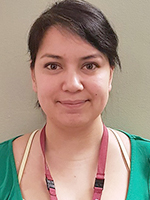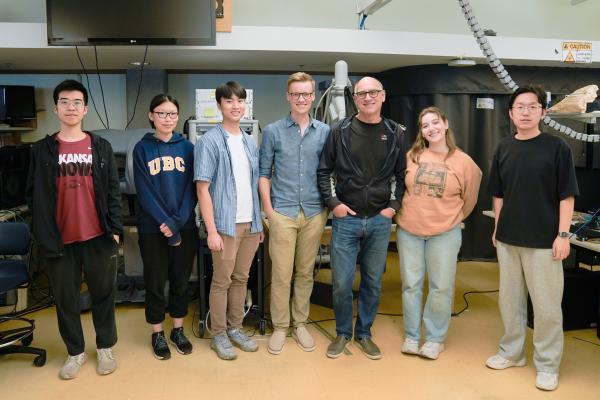
Congratulations to the 2016 Knowledge Translation Challenge award recipients!
Vancouver Coastal Health Research Institute (VCHRI) supports health improvements and innovation through its Knowledge Translation Challenge. This competition challenges health practitioners to translate research discoveries and evidence into everyday practice to improve patient care. The challenge brings together practitioners who do not have knowledge translation experience with researchers who provide knowledge translation mentorship and resources. The Knowledge Translation Challenge facilitates innovative research projects with direct application to advances in patient care.
These projects are made possible through a Providence Health Care & Vancouver Coastal Health Knowledge Translations Grant, funded by the Robert H.N. Ho Enhancing Patient Care Fund.
The team leads of the 2016 Knowledge Challenge Award winners are:
- Melissa Austin, occupational therapist, clinical resource therapist
- Judi Dueck, occupational therapist, clinical resource therapist
- Lillian Hung, clinical nurse specialist
- Mariève Legrand, clinical coordinator
- Renee Lieu, occupational therapist
- Alison McKee, clinical quality and patient safety coordinator
Implementing the cognitive evaluation guideline into occupational therapy into practice

Project title: Cognitive evaluation—translating a clinical practice guideline into occupational therapy clinical practice
This project aims to translate the clinical practice guideline entitled: Cognitive Evaluation Guideline (for Occupational Therapy) for the Adult Population into practice at Vancouver Coastal Health (VCH). Since the guidelines were released in 2013, there has been no formal knowledge translation to enable occupational therapists to implement them within their practice. Many therapists are unaware of the guideline and the process outlined in the guideline is inconsistently followed.
This knowledge translation project will serve as a feasibility study for the implementation of the guidelines across all areas of occupational therapy practice at VCH. The project will provide education, information, mentoring and auditing to increase awareness and uptake of the OT cognitive practice guideline.
“Occupational therapists play a critical role in identifying cognitive impairments that impact function for daily living. This knowledge translation project will support occupational therapists to be clear in the purpose, assessment, analysis and plan of their cognitive evaluation,” explains Melissa Austin. “This impacts clients throughout VCH, for example, assessing cognition as it relates to safe and efficient discharge planning from acute care to community, identifying supports and resources required to ensure clients in the community live safely in their own homes, and determining the strengths and barriers for providing appropriate care to individuals living in residential care.”
Improving feeding, eating and swallowing assessment for seniors in residential care

Project title: Implementation of the McGill Ingestive Skills Assessment in VCH health residential care facilities
The prevalence of dysphagia (a condition that causes difficulty eating and swallowing) for seniors in residential care is reported to be 60 per cent. Health risks include dehydration, malnutrition, respiratory infections, aspiration pneumonia, increased hospital readmissions, institutionalization and mortality.
The current eating and swallowing assessment conducted by occupational therapists (OTs) in residential care has focused on impairment rather than on function, participation, and environmental factors. This project will promote and measure the use of the McGill Ingestive Skills Assessment (MISA) which will provide a standardized formal assessment of mealtime performance in a natural setting. Information gathered during this assessment will enable the resident or decision maker to make well-informed care planning decisions about diet textures, eating at risk, and reducing the negative impacts of dysphagia.
“Consistent use of MISA by OTs has the potential to significantly improve the health, quality of life and person-centred care of our residents,” explains Judi Dueck. “It will also increase role clarity, confidence and the ability of OTs to address residents’ functional eating goals while engaging in evidence informed practice.”
Developing workforce capacity to improve care for patients with dementia

Project Title: Moving PIECES into community care
Dementia currently impacts 62,000 British Columbians, and this number is expected to rise with our aging population. There is an urgent need to develop workforce capacity to help health care teams adopt best practices to address safety risks and improve quality of care for patients with dementia.
This project proposes to spread the P.I.E.C.E.S. model for assessment and care planning in dementia care across programs in BC to support continuity of care. This holistic model incorporates Physical, Intellectual, Emotional, Capability, Environment and Social History training and has shown to increase staff members’ ability to improve clinical outcomes for patients with dementia, such as reducing responsive (aggressive) behavioural events.
“We hope this research will promote patient safety and avoid staff injury, promote person-centred and family-centred care, and improve the quality of care of British Columbians affected by dementia,” says Lillian Hung.
Enabling best practices for post-stroke rehabilitation

Project Title: Upper extremity management post-stroke—moving evidence-based best practice into action
Approximately 60,000 people with stroke are treated in Canadian hospitals annually. Stroke is the leading cause of adult disability and a large number of stroke survivors do not regain normal function. Effective therapeutic techniques have been developed for individuals who have minimal arm movement, but therapists rarely have enough time to sift through all the best practice recommendations when they have full and busy caseloads.
The goal of this project is to disseminate and implement the Canadian Stroke Best Practice Recommendations, specifically in the area of treatment of upper extremity post-stroke, at 2 VCH locations. By creating a quick and easy guide for occupational therapists and physiotherapists to reference, this project will help reduce the gap between current knowledge and clinical practice for upper extremity management.
“Our goal is to raise therapist awareness and implementation of the Canadian Stroke Best Practice Recommendations, specifically in the area of treatment for upper extremity post stroke,” explains Mariève Legrand. “In a continually changing health care environment, it is essential that clinicians value continuing medical education by providing the most up-to-date evidence-based therapy.”
Preparing for clients with disabilities to transition into adult care

Project title: Injury prevention and decision making around the no-lift policy in the community setting
Children and youth with intellectual disabilities often need assistance being transported. When they are young, caregivers and family members often lift and transfer the child without using adaptive specialized equipment. However, when adolescents enter the adult health care system, policies such as the “No-Lift” and “Safe Patient Handling” policies come into effect to protect the safety of health care workers and clients.
This change in health care practice can cause distress for unsuspecting or unaware clients, families and caregivers who suddenly need to find equipment, make adaptions to their home and vehicles, and determine acceptable levels of care. This project will develop educational materials, workshops, and provide consultation with clients, families and caregivers to increase awareness, understanding, communication and preparation for their child’s transition into the adult health care system.
“It’s our hope that this project will help prepare families and clients for changes in the adult system, and be a positive support during this transition,” says Renee Lieu.
Taking surgery recommendations online to improve recovery

Project title: Online learning to enhance the success of the Enhanced Recovery after Surgery Pathway in our community hospital
Enhanced Recovery After Surgery (ERAS) is a multidisciplinary care pathway validated by best practices and proven to achieve early recovery after major surgeries. Educating nurses and, by extension, patients, on ERAS is a major component of its successful implementation.
Richmond hospital aims to build on the successes of ERAS by making education more robust and accessible. This project will highlight the evidence behind key components of ERAS in an online module, aimed at engaging nursing staff. This online module will provide an effective form of education and aid in the sustainability of the ERAS program at Richmond Hospital.
“Our goal is to provide nursing staff throughout the Enhanced Recovery pathway with concise, unified information in order to better understand their knowledge and understanding of best practices for the care of all ERAS patients. Having one engaging and informative online resource for all staff, new and existing, to access on an ongoing basis will help sustain the efforts and success of ERAS in the long term,” says Tara Caroll, the Richmond Hospital ERAS Coordinator.


